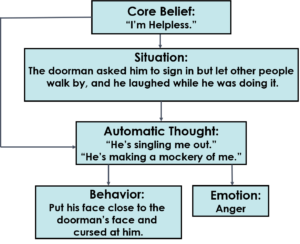
Imaginal Dress Rehearsal
By Francine Broder, PsyD
Beck Institute Faculty
My client Charlie had a stressful situation with the doorman at his friends’ apartment building. He was asked to sign in, which he did not want to do and hadn’t had to do in the past, and assumed the doorman was wielding his power.
In session, Charlie was able to move from self-defeating thoughts and behaviors about this experience, to being able to establish a warm relationship with the doorman.
Charlie was able to shift from defiance to willingness to experiment with prosocial behavior with the doorman given these factors:
- The therapeutic alliance is strong which allowed him to calm down and engage in a collaborative session despite being upset about the incident with the doorman.
- I taught him a brief relaxation breathing exercise which helped him feel less out of control.
- We had been working on identifying and modifying cognitive distortions and this was a perfect opportunity for him to see that his automatic thoughts are not always accurate.
Here is how I conceptualized the incident according to the cognitive model.

Charlie initially had a difficult time generating alternative views of the situation, but with help was able to come up with, “Maybe the doorman didn’t ask the other people to sign in because they live here. He may have laughed because he was nervous.”
Given the patient’s core belief of helplessness, and to prepare the client for future interactions with the doorman, I designed an imaginal dress rehearsal, an intervention I learned from Dr. Aaron Beck. In this dress rehearsal, the patient practiced prosocial behavior in which he could imagine acting and feeling strong instead of weak and helpless.
- Looking at the doorman as he approached the desk
- Greeting the doorman by saying “Hey, man, how’re you doing?”
- Signing the sign-in book
I also made sure Charlie knew his options. In the future, if he did not want to engage in this prosocial behavior, he could call his friend to let him into the building and avoid the need to interact with the doorman. After the session, though, Charlie was empowered to make amends. He apologized to the doorman and has continued to greet the doorman each time he goes to visit his friend. Additionally, Charlie reports that he and the doorman have a brief but enjoyable social exchange each time he visits the building. They recently discovered they have some common interests.
In summary, the continued practice identifying and modifying inaccurate thoughts was helpful, but I think the main factor in Charlie’s turning point was the imaginal dress rehearsal. He was able to “try on” being confident and strong in the safety of my office, and then try it out in real life. Charlie’s willingness to experiment with prosocial behavior seems to have led to the start of a positive relationship.
Upcoming Workshop
CBT for Depression and Suicide
November 30-December 1, 2018
Nashville, TN